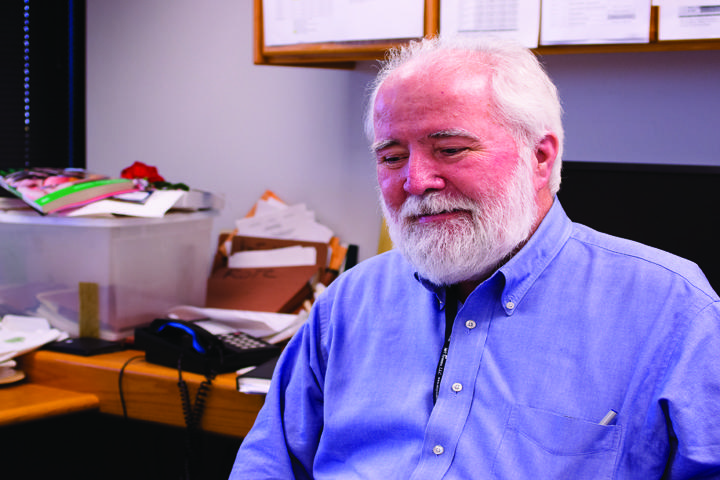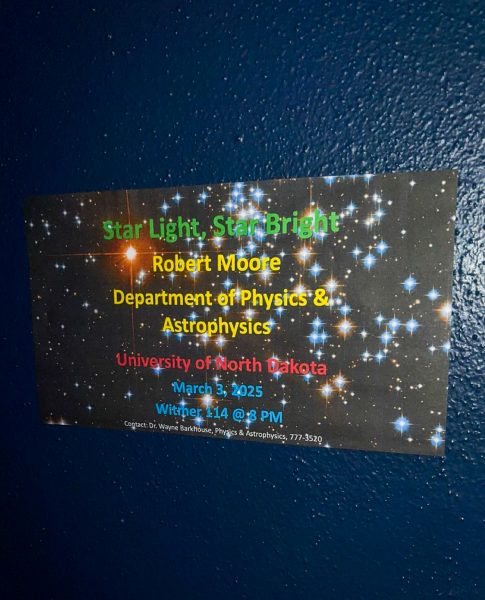Professor writes trilogy, 40 year process
UND professor David Whalen is a writer, teacher and scientist. Photo by Nicholas Nelson/The Dakota Student.
From chapters of his third book laying around the office to a helmet he wore in the Black Panther navy squadron in Vietnam, the office of David Whalen is a representation of a long and fascinating career that took him around the world.
The UND space studies professor’s career eventually led him to start on a book trilogy, the second of which was just published.
Whalen first got interested in outer space at a young age, reading books by Robert Heinlein, that were science fiction books designed to get young boys interested in technical things.
“I knew by about the age of 7 I was very much the space cadet,” Whalen said.
This interest lead him to later receive his bachelor’s and master’s degrees in astronomy.
One of his first jobs out of grad school was as supervisor celestial mechanics at Western Union in 1974.
“I learned how to fly and navigate a communication satellite,” Whalen said. “I had my own little group. It was a lot of fun.”
This was the start of a 30-year career in satellite communications and the beginning of an interest in the decisions of upper management.
“Starting with the very first company, I was kind of struck by the strange decisions they were making, and I couldn’t understand why from an engineering point of view,” Whalen said. “So I decided some day I’m going to write about this.”
This led him to pursue his executive MBA and a Ph.D in science and technology/space policy.
While in the satellite communications business, Whalen worked for organizations such as Loral, RCA, Lockheed, Ford Aerospace, BDM and Asia Satellite, among others, one of which involved working for Osama Bin Laden.
“I worked for Bin Laden,” Whalen said. “I worked for his father. Osama was one of probably 200 children. His father was an investor, and the company I was working for was an adviser to him.”
The peak of his career was at Asia Satellite and Telecommunications Company in Hong Kong as chief engineer.
“I love teaching. I love writing. But I remember a life where I traveled first class and stayed at five star hotels,” Whalen said.
Beginning with the idea, the book series has been around a 40-year process for Whalen. The first book in the trilogy is about the origins of satellite communications. His newly published second book titled, “The Rise and Fall of COMSAT: Technology, Business, and Government in Satellite Communications,” is about the company that paved the way for satellite communication and how it eventually died.
“I’ve described COMSAT as a technological Camelot,” Whalen said. “They had all the highest tech, they had all the best and brightest, just the smartest engineers came there.
“COMSAT in its last 15 years probably lost 2 billion dollars on different projects, trying to get a business that would go beyond what they were doing before,” he said. “Since the government had basically cut them off, they failed, but the company disappeared. It was kind of sad. They did good things.”
Whalen’s books are academic, but if he would’ve included all the inside information on COMSAT it would’ve had all of the drama and intrigue of a best-selling novel, complete with alcoholics and womanizers.
“In the latest book I tried to add a little bit more excitement in it.” Whalen said. “But in some cases I held back because I know most of these people and I really don’t want them angry at me or embarrassed.”
Nonetheless, the second book serves as a huge accomplishment that took 12 years to complete.
“It would’ve taken less except I had a regular job for awhile and was chair of the department from 2007 to 2010,” Whalen said.
After his long career in satellite communications Whalen decided to pursue teaching, something he had always planned he would do one day.
“So I came here and found out, as I had expected, that I loved teaching,” Whalen said.
The third and final book in Whalen’s series is already in the works, chapters of it scattered around his office.
“I think the third book is more about the real business, what really happened,” Whalen said. “… now I’m going to talk about everyone else and their primary business with satellite communications. The next book just might sell more because it’s about satellite television, so that’s going to be a fun story.”
Ashley Carlson is a staff writer for The Dakota Student. She can be reached at ashley.m.carlson@my.und.edu.










